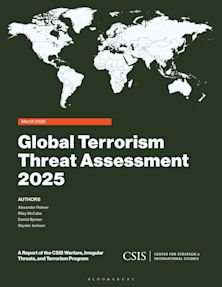- Home
- ACADEMIC
- Politics & International Relations
- Security and Strategic Studies
- Shrewd Sanctions
You must sign in to add this item to your wishlist. Please sign in or create an account
Description
Policymakers will need all the tools at their disposal to craft an effective response to international terrorism and to protect and promote other U.S. interests in the coming decades. In this quest to shape the right strategies for the challenges ahead, economic instruments will play a central role. O'Sullivan, an expert on the use of positive and negative tools of economic statecraft, argues that in the post-September 11th international climate, the United States will be even more willing to use its economic power to advance its foreign policy goals than it has in the past. This impulse, she argues, can lead to a more effective foreign policy given the many ways in which sanctions and incentives can forcefully advance U.S. interests. But a recalibration of these tools—sanctions in particular—is necessary in order for them to live up to their potential. Critical to such a reassessment is a thorough understanding of how the post-cold war international environment—globalization and American primacy in particular—has influenced how sanctions work. O'Sullivan addresses this issue in a thorough examination of sanctions-dominated policies in place against Iran, Iraq, Libya, and Sudan. Her findings not only highlight the many ways in which sanctions have often been poorly suited to achieve their goals in the past, but also suggest how policymakers might use these tools to better effect in the future. This book will provide a valuable resource for policymakers groping to find the right set of instruments to address both the old and the new challenges facing the United States. It will also serve as an important resource to those interested in U.S. policy toward 'rogue' states and in the status of the sanctions debate between policymakers and scholars.
Product details
| Published | May 13 2004 |
|---|---|
| Format | Ebook (PDF) |
| Edition | 1st |
| Extent | 424 |
| ISBN | 9780815706007 |
| Imprint | Brookings Institution Press |
| Publisher | Bloomsbury Publishing |


































